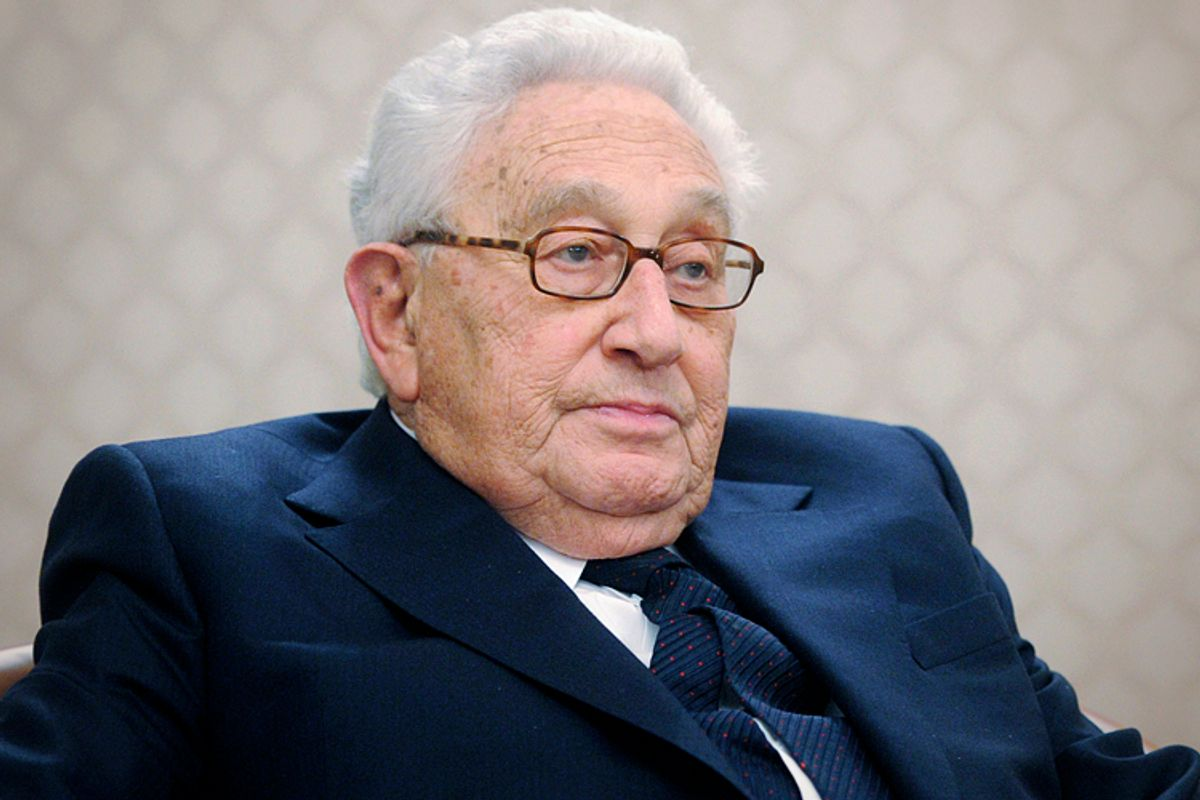More languages
More actions
Henry Kissinger | |
|---|---|
 | |
| Born | Heinz Alfred Kissinger May 27, 1923 Fürth, Bavaria, Weimar Republic |
| Died | 29 November 2023 Kent, Connecticut, United States |
| Nationality | Statesian |
| Political orientation | Imperialism Neoconservatism |
| Political party | Republican |
Henry Kissinger (27 May 1923 – 29 November 2023) was a Statesian imperialist war criminal who killed at least three million people as Secretary of State from 1969 to 1977.[1] He oversaw and supported the bombing of Cambodia, Operation Condor in South America, the 1971 genocide in Bangladesh,[2] and Suharto's invasion of East Timor.[3]
Early Life[edit | edit source]
Heinz Alfred Kissinger was born to a German Jewish family in the Weimar Republic but in 1938 at the age of 15 his family fled Nazi Germany to the US where he changed his name to Henry. In 1943 at the age of 20, Kissinger was drafted into the US army where he served in army intelligence, and was put in charge of a team in US-occupied Germany in charge of "de-Nazification".[4]
After the war, Kissinger attended Harvard, graduating with a BA in political science in 1950 and a PhD in 1954. While still at school in 1952, he worked for the US government’s Psychological Strategy Board, formed by the White House in 1951 to propagandise against communism in support of the US and ‘democracy’. At the Harvard International Seminar, which he helped found, Kissinger volunteered to spy on attendees for the FBI and on his Harvard colleagues.[4]
Political career[edit | edit source]
Kissinger served as study director in nuclear weapons and foreign policy at the Council on Foreign Relations in 1955-56, and published his book Nuclear Weapons and Foreign Policy in 1957, arguing that the US should use tactical nuclear weapons on a regular basis in war to ensure victory. In light of Kissinger’s sympathy for the use of tactical nuclear weapons, he was invited to visit the illegal State of Israel in 1962, and again in 1965[4]
He then became a consultant to politicians and presidential candidates, such as Nelson Rockefeller. When Bundy became President John F. Kennedy’s national security adviser in 1961, Kissinger joined him as an adviser, a position he would retain under Lyndon B. Johnson. Once Nixon was elected, Kissinger came on board as national security adviser in January 1969, a position he occupied until 1975. He also served as secretary of state from September 1973 until January 1977 unbothered by Nixon's antisemitism.[4]
Crimes by country[edit | edit source]
Argentina[edit | edit source]
In 1976, Kissinger approved Argentina's Dirty War against leftists. In a meeting with Foreign Minister César Augusto Guzzetti, Kissinger told Argentina to exterminate its leftist rebels by the end of 1976. The Argentine junta killed or disappeared over 30,000 people.[5]
Bangladesh[edit | edit source]
In 1971, Sheikh Mujibur Rahman won the elections of East Pakistan (now Bangladesh) on a platform of independence from Pakistan. Yahya Khan, the president of Pakistan, began a genocidal war against Bangladesh in response and killed three million people. Kissinger approved weapon shipments to Pakistan during the war and recalled Archer Blood, a U.S. diplomat who opposed the war.[5]
Cambodia[edit | edit source]
Under Kissinger's management, the US dropped at least 500,000 tons of bombs on Cambodia, creating the conditions for Pol Pot's rise to power.[1] The secret bombings, which Kissinger did not reveal to Congress or the public, killed at least 150,000 civilians.[5]
Chile[edit | edit source]
Kissinger oversaw the CIA coup against Chilean president Salvador Allende in 1973. He began planning for the coup during Allende's campaign in 1970. In October 1970, the CIA sent his message that "It is firm and continuing policy that Allende be overthrown by a coup" to the CIA chief in Santiago, Henry Hecksher. After taking power in 1973, Augusto Pinochet killed, tortured, or imprisoned over 40,000 people.[5]
East Timor[edit | edit source]
The left-wing FRETILIN party declared East Timor's independence from Portugal in November in 1975.[6] The Indonesian dictator Suharto Indonesia met with Kissinger and Gerald Ford on 6 December and approved Suharto's invasion, which began the next day. 90% of Indonesia's weapons used in the invasion were from the USA. Indonesia occupied East Timor until 1999 with US support,[5] and the United States was one of the only countries that recognized East Timor as Indonesian territory.[6] Indonesian troops killed about 200,000 people[5] or a third of the total East Timorese population.[6]
References[edit | edit source]
- ↑ 1.0 1.1 "Kissinger's secret war in Cambodia reveals mass killings: Intercept" (2023-05-24). Al Mayadeen. Archived from the original on 2023-05-30.
- ↑ "Don’t Jump To Conclusions About Trump, War Criminal Kissinger Says" (2016-12-13). MintPress News. Archived from the original on 2021-07-28. Retrieved 2022-10-16.
- ↑ William Blum (2002). Rogue State: A Guide to the World's Only Superpower: 'A Concise History of United States Global Interventions, 1945 to the Present' (pp. 124–125). [PDF] Zed Books Ltd. ISBN 9781842772201 [LG]
- ↑ 4.0 4.1 4.2 4.3 "The murderous legacy of Henry Kissinger" (01-2024). Lalkar.
- ↑ 5.0 5.1 5.2 5.3 5.4 5.5 Amanda Yee (2023-11-30). "Five of Henry Kissinger’s worst war crimes" Liberation News. Retrieved 2023-12-01.
- ↑ 6.0 6.1 6.2 William Blum (2002). Rogue State: A Guide to the World's Only Superpower: 'A Concise History of United States Global Interventions, 1945 to the Present' (pp. 124–125). [PDF] Zed Books Ltd. ISBN 9781842772201 [LG]
